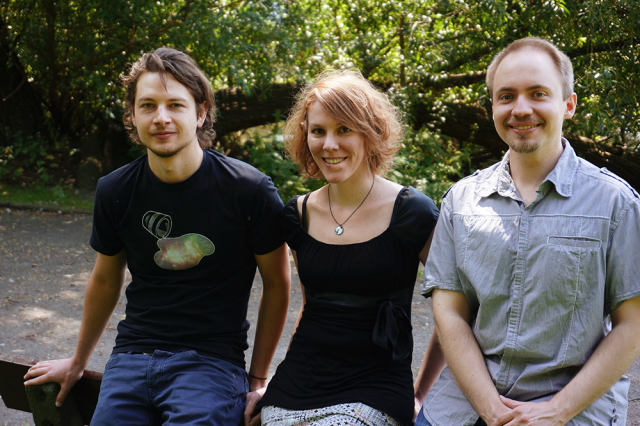
Orwell Interview
We sat down with Mel Taylor and Dan Marx, two of the minds behind the adventure thriller Orwell: Keeping an Eye on You.
First of all, how would you describe the game to someone who didn’t get the George Orwell “Orwellian 1984-like state” reference of its title?
Orwell recruits the player as an investigator, working for the government. Players are told that they are essential in order to find out who is behind a series of attacks that shake the fictional city of Bonton. But the player gets more and more involved in the lives of the target persons she or he is investigating and has the power to decide over their fate by choosing which information is fed into the Orwell system.
The predominant theme in George Orwell’s writing is not only omnipresent surveillance, but also propaganda, falsifying and hiding information from the public.
We thought collecting and filtering information would make for a great game mechanic reflecting the topics of George Orwell’s writing. Orwell is not only about surveillance, but rather about the ambiguity of online data, how people hide behind it and how they are judged by it.

Where and how did inspiration strike for the idea that would turn into Orwell?
Years ago, I had the very vague idea of making a thriller that's solely taking part on a PC's desktop for quite a while (at that time nobody had made such a game as far as I know, now we have a few), but I wasn't quite sure what the topic for it should be. All I could possibly come up with was somewhat lame, nothing that would really click. At that time Mel and I thought about founding a game development studio, and we needed a first project.
Coincidentally, this was also the time the Snowden leaks were a big media topic, with all their revelations about surveillance systems like PRISM. So one day I just found myself thinking: So, what would it be like being in control of one of these things? What must it feel like spying on other people? And then it suddenly hit me: What if we made our desktop thriller based on this?
What type of scenarios will we see in Orwell and how much can the player the change them?
If you played the demo, you might have noticed that Orwell gives the player access to three tools: The Reader, the Listener and the Insider. The Reader is unlocked right from the start and gives you access to websites. The Listener grants the player the ability to eavesdrop on all kinds of communication. In the demo, the player is only able to view chats in this tool. At a later stage, the player will also be able to "wire-tap" phone calls and read emails. The Insider is the most private of these tools and the player will be able to view documents on target person's devices, such as personal computers and mobile phones, through this tool. I do not want to spoil too much, which is why I will leave it up to your imagination, which kind of scenarios could arise from investigating data through these tools. The player is able to influence the storyline by deciding on which information to add to the system. In some cases, this has major consequences regarding the fate of target persons that can also have further influence on what happens next.

How long did development take?
We started Osmotic Studios in April 2014, working on Orwell, but also doing projects for other companies at the beginning. We started working full-time on Orwell in 2015, so this sums up to approximately two years.
Was there any particular real life event which fed into your desire to make this type of game?
Definitely the Snowden revelations and the discussions that followed. It inspired our game designer Daniel, who came up with the idea about three years ago.
Were there any hiccups along the way?
Yes. It is our first commercial project, so we were rather inexperienced when we started. At the beginning, we wanted it to be much longer, include a lot more features and had a much less defined picture of the overall concept. The art style and the interface also looked very different, which we improved quite a lot.
What are your general game development influences?
We have a lot of role models, such as Gone Home. This game is also very investigative and the player experiences the story indirectly by finding out what happened. But the most influential was probably Lucas Pope's Papers, Please which not only has a political theme, but also difficult choices which influence the outcomes of the game.
Were there any features you wanted to implement, but ran out of time/money for?
As mentioned, we had Orwell in mind as a much longer game at the beginning, with a story that is a lot more epic and containing many more features that the player could use to experience this story. For instance, a tool called messenger, that was an internal Orwell communication tool. With this, the player should be able to communicate with superiors and even target persons at a later stage. Another feature that did not make it into the game was a "suspicion level" for each character. We decided against this, since we did not want to gamify the investigation itself. The player should not be influenced by any bars or points when finding information on people. It is generally difficult to encourage the player not to add all datachunks into the profiles, since this is the first intuition of most players and also the game's progress is tied to this. But we definitely wanted players to think about their decisions before adding data to the system, so we excluded this feature from the game.

What prompted the move to episodic? And releasing them weekly?
This was actually an idea that Surprise Attack (the publisher) came up with. The idea of releasing the game episodically seemed natural, since Orwell was divided into game days from the beginning. Players should get a sense of time passing by and things happening in the world that they interact with. But we did not want too much time to go by between episodes, since players should not lose track of their investigation. So we originally planned to release it as a complete game.
Surprise Attack then came up with the idea of the weekly episodic release, similar to a TV show. We thought this was a great idea, since players could discuss the current events of the game during this week and look forward to what happens in the next episode. We really hope that players will exchange views about events and compare their decisions, since we would love to encourage people to reflect on Orwell's themes themselves.
Do you think you might be on some sort of government list now?
We suppose they might be keeping an eye on us.
If you could hide in any country’s embassy to avoid police capture, which would it be?
It probably depends on the charge. According to Edward Snowden, South American countries seem to be good places to hide if you are being charged of violating the Espionage Act by the US government. Julian Assange appears rather safe in the Ecuadorian Embassy in London, so this might be a good place. His kitten also seems to like it there, so this could be one of our first choices.
Finally - What do you think about the Nintendo Switch?
Well, they've chosen a terrific date for their announcement for sure! I've never been much of a great console or handheld player myself, but the idea to seamlessly switch between the two seems intriguing enough that I'm willing to give it a try.













COMMENTS